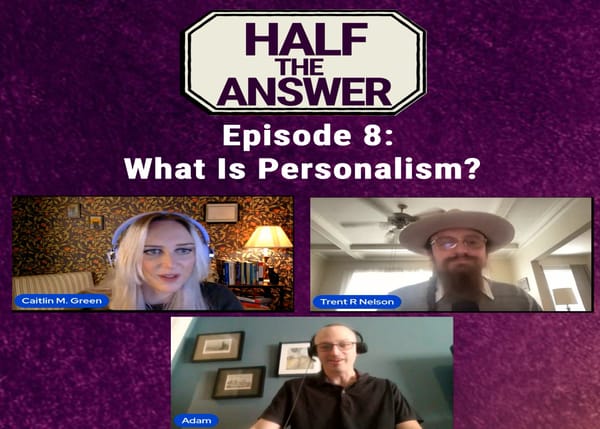A Caring Liberalism

“Care always expresses an action or a disposition, a reaching out to something…what it means to be a citizen in a democracy is to care for citizens and to care for democracy itself,” argues Joan Tronto, a prominent care theorist.[1] By living in a democracy, we reach out to others. She does not write liberal democracies; nonetheless, her work addresses them. The argument that liberal democracies are nations of people who care for each other and for the system itself is a far cry from traditional care theory, which flatly rejects liberalism as alienating. However, could there be a middle ground? If liberalism is not inherently caring, do the philosophy or the system nevertheless make room for care? Liberalism addresses the relationship between the individual and the state, focusing largely on the restraints of citizens towards each other. Calling this the “trespassing tenet,” I contend that while liberalism is interested in citizens not trespassing each other’s boundaries as a form of restraint, caring liberalism reframes it as a means of support.
Care theory holds that care is the centrifugal force of life. We depend upon care in order to live through infancy. We will need care at the end of our lives. Undoubtedly, we will also need care somewhere in between. Care, then, exists outside of governing structures. It simply is. Tronto’s position is that due to this ever-present nature of care, it is naturally political.[2] She thinks that liberalism can be caring because of care’s presence, but it is not guaranteed to be. It is a possibility, and this possibility is the focus of her work. Tronto makes use of liberalism’s focus on the liberty of the individual to avoid the problem of commonality that plagues alternative theories and systems.
Liberalism’s focus on the individual and others is usually framed in terms of constraint. J.S. Mill describes the cultivation of the individual as happening, “within limits imposed by the rights and interests of others” by respecting these limits, “human beings become a noble and beautiful object of contemplation…”[3] Mill’s ideal person is not someone caring for others in order so that they reach the potential one has in liberalism; instead, the ideal person avoids trespassing onto others’ rights. This theory of trespassing on rights is most salient in that liberalism seeks to avoid boundaries on personal liberty that are not necessary. Mill, fully aware of the provoking nature of his work, argues that a person should be restricted by the government in terms of their actions if it hurts the common good. People are related to one another based on the avoidance of trespassing insofar as it harms the common good. Mill in On Liberty emphasizes the ability of a person to reach an almost Aristotelian end, to achieve a happy life, insofar as they are not intruded upon. Care is an intrusion, different from state interference when a person is endangering others. The intrusion of care is a moving out of one’s own realm, into the other via a care that is supportive rather than restraining.
Mill’s framing of liberalism, then, is compatible with care. By caring for others, we do not “trespass” onto their rights. Care is frequently framed as something done so that people can live full lives. If one interfered in a situation where someone was being abused, by helping the victim of abuse find safe housing the abused person’s right to privacy and non-interference would be transgressed, but it would be one transgression, so to speak, used to check the transgressions of the abuser. By helping the victim to find safety, one enables that person to reach the noble ends that Mill argues are central to our lives. The trespassing principle makes room in liberalism for care theory to operate; however, the problem of personal liberty persists.
Liberalism primarily attends to the individual’s relationships toward the government and other citizens. Personal liberty is essential to liberalism. It is the liberty to act and not be acted upon, while liberalism is interested in the relationship of the government and society it attunes itself to boundaries. Care theory, in contrast, is a philosophy of trespassing boundaries. It avoids acting upon others, but it always implies a form of action tending toward others. Care theory is interested in personal liberty insofar as it can exist. Caring liberalism does not de-emphasize liberty. Instead, it emphasizes a person’s ability to exercise their liberty.
Martha Nussbaum has advanced a theory similar to Tronto’s, the “capabilities approach.”[4] Tronto acknowledges the capabilities approach as central to understanding care. Nussbaum, drawing on economist and philosopher Amartya Sen, argues that a human being’s life should be gauged according to whether a person is able to actualize the things that are necessary for a flourishing life. One such capability that care theory rests on is that of interpersonal relationships. It is necessary to have relationships with others, Nussbaum contends, in order to have a flourishing life. The capabilities approach is Aristotelian; each capability is necessary to live a meaningful life. The meaningful life is a fully human life, and Nussbaum believes that when a capability does not exist within a person’s life, they are not living a human life.
Care theorists frequently reference Nussbaum, arguing that capabilities are intrinsic to caring. Caring for others, they argue, is facilitating human beings living a fully human life. Nussbaum’s capability of “affiliation” is central to care theory’s adoption of her theory, for it focuses on how human beings interact. However, Nussbaum is cautious in leaving affiliation in the hands of communities; a community may see certain individuals as unworthy of developing relationships with others, and thus not be able to engage in this capability. In order to avoid this, she describes capabilities as being supported through state means. Nussbaum notably does not dictate how this would be done; nonetheless, care theorists, such as Engster, argue that she moves care away from the communal.[5] Care theory uses the capabilities approach as something that is done in the everyday. The focus of care theory is how affiliation is carried out within the community, with the state having a secondary role. Tronto locates care as coming first from the home and then from larger communities. The role of the state is to support care, and while it may have a role in it, the space of care will always be primarily understood as communal.
According to Amartya Sen, the state is necessary to ameliorate harm towards marginalized minorities; however, he contends that in addressing harms multiple states and communities should be involved.[6] By involving multiple states, it prevents parochialism. The example Sen focuses on is the marginalization of women. He chooses this because it is a common global occurrence; if we wish to address equality for women, he argues, we must have the insight of the global community to avoid discrimination that may be deeply embedded in a state’s culture. Care theory examines the problem of parochialism in marginalization in terms of how marginalized individuals are able to exercise their liberties. By starting from this point first, we begin from a standpoint of community, and how to address those harms from within the community as opposed to drawing in outside bodies. In using the example of the marginalization of women, Sen points out that because a society is patriarchal, it will not be able to give women rights by simply relying on itself to address systematic harms. Care theory centers the task of ameliorating harm by focusing on the needs of the marginalized person or persons. Thus, care theory attends to the person who has been harmed. In a situation of systematic misogyny, a society would be judged as caring if the marginalized group is effectively able to live, as Nussbaum and Tronto write, a flourishing life. Tronto centers her societal judgement on effectiveness. It is not enough for a community to care; in order to ameliorate harm, it must effectively help the individuals who have been harmed.
By integrating liberal democracy into care theory, one is able to apply the concept of effective access to liberties, addressing parochialism. By centering caring liberal democracy around the capability to exercise liberties, one can address societal inequalities through appealing to liberal democratic values. The misogynistic society that Sen grapples with would be judged according to how effectively a society is able to support a woman’s access to liberal democratic freedoms. Caring liberal democracy maintains the principle of tending to the marginalized person or persons’ needs, while focusing on the more expansive task of whether or not a person is effectively able to exercise liberal freedoms.
The avenue towards a caring liberal democracy exists through applying the trespass principle towards personal liberty; all people should be able to achieve the freedoms espoused by liberalism, and if they are not currently capable of reaching them then they will be supported in such a way that it will be possible for them to do so. Instead of thinking care as reaching for others, it can be thought of as supporting. When we care for others in a liberal democracy, we support them so that they can exercise their liberty. Caring liberal democracy is separate from the models described above due to it being centered within the community. The needs of marginalized minorities are central to the community because care asks us to cross boundaries to support the other.
If liberal democracy is to integrate care, it can be done so under the principle that supporting the other allows them to exercise their personal liberty. This allows us to resolve the problem of liberalism’s rule against trespassing onto an individual’s personal liberty. Once personal liberty is framed in the question of the trespass principle as supportive, it is acceptable to both care theory and liberalism. A caring liberal democracy exemplifies democracy as ends based. All people would be treated as ends; this Kantian principle overlaps with both care and liberalism. It is not the present quality of care which makes it able to be integrated into liberalism. Instead, it is the tenet that we trespass insofar as others can reach their noble ends.
[1] Joan Tronto. 2013. Caring Democracy: Markets, Equality, and Justice. (New York: New York University Press), x.
[2]Joan Tronto. 1993. Moral Boundaries: A Political Argument for an Ethic of Care. (New York: Routledge).
[3]J.S. Mill. 2001. On Liberty. (Batoche Books), 57.
[4]Martha Nussbaum. 2013. Creating Capabilities: The Human Development Approach. (New York: Belknap Press).
[5]David Engster. 2009. The Heart of Justice: Care Ethics and Political Theory. (Oxford: Oxford University Press).
[6]Amartya Sen. 2011. The Idea of Justice. (New York: Belknap Press).
Featured image is Mother and Child in a Rockingchair, by Eastman Johnson




